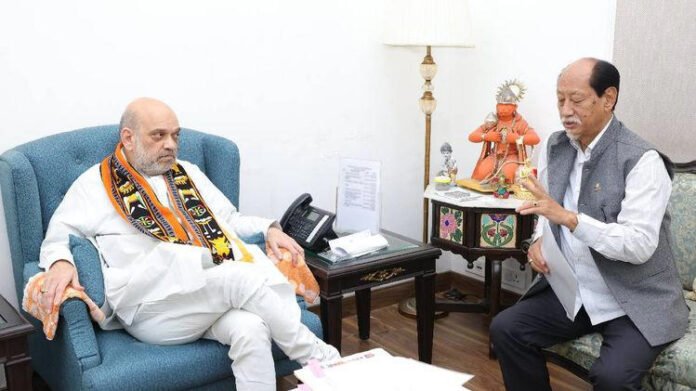Nagaland’s Chief Minister, Neiphiu Rio, has recently stated that the state is awaiting a formal response from Union Home Minister Amit Shah following the crucial all-party delegation meeting that took place in New Delhi. The meeting, which brought together various political parties and leaders from Nagaland, was aimed at addressing the ongoing Naga political issue. This longstanding issue has been a source of tension for the state and its people, with hopes high that the government will soon provide clarity and concrete steps toward resolving it.
The Naga political issue, which has been a central concern for Nagaland for decades, involves demands for greater autonomy and the recognition of Naga identity, particularly by the Naga Nationalist Movement, which has been engaged in peace talks with the Indian government for over two decades. The resolution of this issue has remained elusive, despite multiple rounds of negotiations, and the meeting with Amit Shah was seen as a critical step in breaking the deadlock.
The Naga Political Issue: A Brief Overview
The Naga political issue traces its origins to the post-independence era when the Naga people, led by the Naga National Council (NNC), sought to establish a sovereign Naga homeland. This led to decades of conflict with the Indian government. However, over the years, the NNC split, and a more moderate faction, the National Socialist Council of Nagaland (NSCN), emerged to carry the political aspirations of the Naga people.
The Naga peace talks, which began in the 1990s, reached a major turning point in 2015 when the Indian government signed a historic framework agreement with the NSCN (IM), a faction of the NSCN. This agreement was seen as a breakthrough, promising a resolution to the Naga political question. However, the details of the agreement were not fully disclosed to the public, and disagreements over certain aspects of the accord, particularly the demand for a separate flag and constitution, have led to a deadlock in negotiations.
Despite multiple attempts to resolve the issue, including an extension of the ceasefire agreements and rounds of talks between various Naga factions and the Indian government, there has been no definitive solution. The people of Nagaland, and particularly its political leadership, are now looking to Amit Shah and the central government to offer a clear way forward.
The All-Party Delegation Meet
The all-party delegation meeting, which took place in the national capital, was an important step toward bringing together all political factions in Nagaland to discuss the Naga political issue. Chief Minister Neiphiu Rio, along with other leaders from the state, participated in the dialogue with Home Minister Amit Shah. The delegation included representatives from the ruling Nationalist Democratic Progressive Party (NDPP), as well as opposition parties in the state, all of whom have been vocal about their desire for a peaceful and lasting resolution to the Naga political issue.
The main objective of the meeting was to present a united front and urge the Indian government to take the necessary steps to resolve the longstanding conflict. The leaders emphasized the importance of involving all stakeholders, including various Naga groups and civil society organizations, in the peace process. The delegation also conveyed the concerns of the people of Nagaland, who are looking for a solution that respects their political aspirations while ensuring peace and stability in the region.
During the meeting, Home Minister Amit Shah reportedly assured the delegation that the government is committed to resolving the Naga political issue at the earliest and that it would engage with all parties involved to find a solution that addresses the aspirations of the Naga people. However, he also stated that the process would take time and that the central government would need to ensure that any resolution respects the constitutional framework of India.
Awaiting Amit Shah’s Response
Since the meeting, the political leadership in Nagaland has been waiting for a formal response from Amit Shah. Chief Minister Neiphiu Rio has reiterated the importance of timely action and transparency from the central government. According to Rio, while there is optimism following the meeting, it is essential for the people of Nagaland to receive clear communication from the Union government about the next steps in the peace process.
The CM’s statement reflects the anxiety and anticipation in Nagaland, where the Naga political issue has been a dominant concern for generations. There is a deep desire among the people for a resolution that brings lasting peace while also ensuring the recognition of their identity, culture, and autonomy. The Naga community, which has endured years of conflict and disruption, remains hopeful that the meeting with Amit Shah will translate into concrete action that will pave the way for a brighter, more peaceful future.
The Road Ahead: Hopes and Challenges
The Naga political issue is a complex one, and its resolution will require balancing the diverse aspirations of the various Naga factions, including the NSCN (IM), the Naga National Political Groups (NNPGs), and the state government. While the central government has indicated a willingness to resolve the issue, it will need to navigate several challenges, including maintaining national unity and ensuring that any resolution is in line with India’s constitutional framework.
Moreover, the concerns raised by the people of Nagaland regarding the inclusion of all stakeholders and the need for a broad-based consensus will need to be addressed. The peace process must ensure that no group is left behind and that the voices of all communities are heard.
In addition, Nagaland’s political leadership is awaiting a decisive response from Amit Shah and the central government regarding the Naga political issue. The all-party delegation meeting was a significant step, but much work remains to be done to ensure a lasting peace. The people of Nagaland, after years of uncertainty and conflict, are hopeful that the government will provide the clarity and leadership needed to bring an end to the Naga political issue once and for all.

